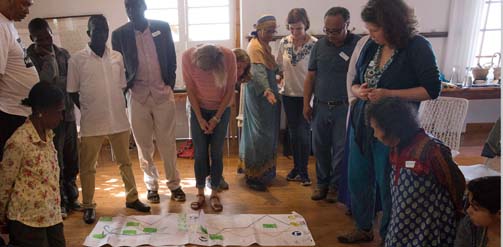This project focuses on the need to consider and address intersecting inequalities – the spatial, economic and identity-based drivers of poverty and inequality – if the Sustainable Development Goals (SDGs) are to be successful. Building inclusive governance that enables the engagement of marginalised groups is central to the SDGs and the global call to ‘leave no one behind’. Our previous research indicates that SDG 16 – building accountable and inclusive institutions – is also an important gateway to reach other goals. Yet these goals cannot be achieved without addressing intersecting inequalities. Failure to do so risks leaving the most marginalised behind.

This research represents the third phase of the Participate Initiative, a participatory research programme co-convened by IDS and Beyond 2015, which generated high quality evidence on the reality of poverty, and brought marginalised perspectives into the post-2015 debate.
A second phase piloted ways to foster learning processes about participatory accountability for the most marginalised. This second phase highlighted:
- that marginalisation is perpetuated when development initiatives do not address intersecting inequalities (Burns et al 2013), and
- sustainable solutions mean developing capacities, facilitating spaces for dialogue with decision makers, and shifting behaviours towards relationships of accountability across multiple spaces and levels.
Project aims:
This third phase is funded by the Sustainable Development Programme of the British Academy. It is working with five partners and will open spaces for the engagement of marginalised groups and other stakeholders – peers, community, business, service providers, funders, government – by building multi-level relationships and communication processes across the wider system.
Its key aims will be to:
- Use participatory learning to explore the experiences of intersectionality of highly marginalised groups in India, Uganda, South Africa, Ghana and Egypt
- Foster on-going dialogue between these groups, duty bearers and other stakeholders in order to generate theoretical and practical knowledge on how to develop accountable relationships in reality
- Provide evidence and insight for policy makers about effective pathways to inclusive and responsive governance, and make a timely input to knowledge on the role of participatory processes in increasing sustainable impact during SDG implementation.
Project activities and partners
Our five partners will be working on a range of research processes as follows:
- Denotified and Nomadic Tribes (DNT) in India: Praxis will research with these hidden and stigmatised communities. Praxis will work with community volunteers in five states to gather participatory statistics and collect stories on SDG targets and to analyse these in ‘Ground Level Panels’.
- People living with disabilities and people living with HIV/Aids in North-Eastern Uganda: Socajapic (Soroti Catholic Justice and Peace Commission) will use action learning to build capacities of these neglected groups in their wider marginalised communities in NE Uganda, to engage with decentralized local government planning, monitoring and accountability mechanisms using formal and informal methods (e.g. citizen charters, Barazas, radio talk shows, community forum theatres).
- Young people and community activists living in extreme urban insecurity in South Africa: Sustainable Livelihoods Foundation (SLF) will address violence and insecurities, building on piloted participatory visual research outputs and linking them to a social media campaign to generate evidence and leverage spaces for accountability on citizen-based monitoring of policing.
- Landless women labourers in Ghana: Radio Ada will work with the Songor Women’s Collective to develop their voice through community radio and strengthen accountability of the newly elected national government.
- Children and adults living with HIV/Aids in Egypt: Center for Development Services (CDS) will use visual methods (digital stories, collective video) to work with these groups and develop collaborative solutions with NGOs and government actors in Cairo and Alexandria.
The project aims to generate missing knowledge on how to promote inclusive, accessible, accountable and equitable societies, governance and institutions.
Participatory methodologies are being used throughout the project and include story-telling, visual methods and participatory action research. These are effective in engaging people, building confidence and structuring reflective and analytical processes.
Partners will come together with IDS researchers to collectively analyse the findings from each of the processes, and develop learning to be communicated in national and global spaces.
Image: Nava Derakhshani. From the SLF Collective workshop process held in Cape Town.
